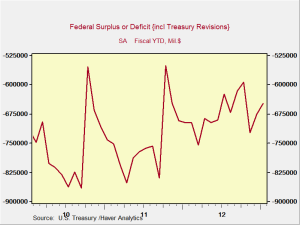We will be hearing quite a bit about the Chained Consumer Price Index (chained CPI) over the next couple days, though most of the details don’t matter. It’s the first of two major takeaways from the president’s proposed budget.
For the sake of completeness, here’s the definition of chained CPI. What matters for the average citizen, however, is one thing: chained CPI increases more slowly than the inflation measures that are currently used, the CPI-U (the CPI for All Urban Workers) and CPI-W (the CPI for All Urban Wage Earners and Clerical Workers). By shifting the measure used, payments for social security will increase more slowly over time.





